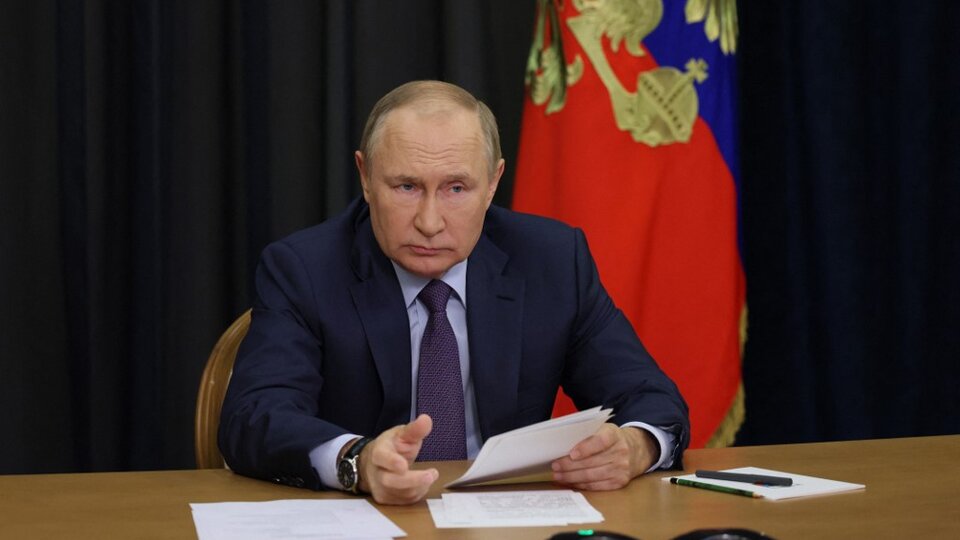
Underwater explosions were recorded and may have been caused by leaks in Russian gas pipelines
Two underwater explosions were reported today in the Baltic Sea off Denmark, before three leaks were discovered in the Nord Stream gas pipeline connecting Russia to Europe.
The Swedish Seismological Institute said today that “two massive energy releases” were recorded just before and near the site of the gas leak off the coast of the Danish island of Bornholm, Swedish Seismological Institute seismologist Peter Schmidt told AFP. News agency National Network.
Explaining that these energy releases are “very sudden,” Schmidt said, “we interpret them as coming from some kind of explosion, with a very high probability.
“The first occurred at 2:03 local time (Sunday 9:03 p.m. Argentina time) southeast of Bornholm, with a magnitude of 1.9. Then on Monday at 7:04 p.m. (Argentina time 2:04 p.m.) we observed another one. The one to the north was slightly stronger. “Looks strong. We estimate 2.3 on the Richter scale,” said the seismologist.
The Norwegian Seismological Network (Norsar) also confirmed that it recorded “a small explosion” in the early hours of Monday morning, “followed by a more powerful explosion” the same day.
The Nord Stream 1 and 2 gas pipelines have been at the center of geopolitical tension in Europe in recent months, since Russia cut off its supplies to Europe in response to Western sanctions against Moscow over its aggression in Ukraine.
Both gas pipelines, managed by a consortium majority-owned by state-owned Russian energy group Gazprom, are currently not operating. However, both still contain gas, which has been leaking since Monday.
In some photos taken by the Danish military on Tuesday, large bubbles with a diameter of 200 to 1,000 meters were seen on the surface of the water from three leaks located in the waters of Sweden and Denmark.
Ukraine said today that the leaks may have been caused by a “terrorist attack” planned by Moscow against the European Union (EU).
“The large-scale Nord Stream 1 ‘gas leak’ is nothing more than a planned terrorist attack by Russia and an act of aggression against the EU,” Ukrainian presidential adviser Mykhailo Podoliak said on Twitter.
Podoliak accused Russia of trying to “destabilize the economic situation in Europe and cause panic before winter.”
“We cannot rule out any hypothesis at this time. It is clear that the pipes are damaged and we cannot rule out any variant until the results of the inspections,” Kremlin spokesman Dmitry Peskov said.
The spokesman described reports of leaks at two gas pipelines as “dangerous” and the Russian government demanded an immediate investigation into what happened, Sputnik news agency reported.
On the other hand, the operator of the submarine gas pipelines refused to give an estimated date when it would be able to resolve the “unprecedented” simultaneous failures of the system’s three pipelines.
“The simultaneous, simultaneous destruction of three cargoes of the Nord Stream system is unprecedented. It is not yet possible to estimate the timetable for the restoration of the gas transportation infrastructure,” Nord Stream announced. AG Company based in Zug, Switzerland.
“I’m not going to speculate on the cause, I know our European partners are investigating. We stand ready to support their efforts,” a senior White House official, who spoke on condition of anonymity, was quoted as saying by AFP today.
“This shows the importance of our efforts to work together to secure alternative gas supplies for Europe, support efforts to reduce gas consumption and accelerate real energy independence by moving to a clean energy economy,” he said.

“Introvert. Thinker. Problem solver. Evil beer specialist. Prone to fits of apathy. Social media expert. Award-winning food fanatic.”





More Stories
Two influencers drown after refusing to wear life jackets: “ruining selfies”
Uruguay 2024 election results: who won and when is the second round | Waiting to know whether there will be a runoff or not
Uruguay: Lacalle Pou leaves with his figure on the slopes | The Marcet and Asteziano scandals hit the right-wing ruler